How Long is a Long Run?
Big data tackles long runs

The cornerstone of any good training regime (after you've mastered wearing shorts) is your long run. Aside from the obvious benefit of becoming accustomed to being on the move for long enough, long runs also help tune up your aerobic systems - your heart, lungs - everything that helps to deliver oxygen to your muscles. Lots of headline-grabbing training programmes focus on improving your ability to handle lactic acid with fast-paced runs and interval sessions - but there's a lot to be said for quietly nudging up your fuel efficiency and endurance whilst everyone else runs themselves into the ground.
But how long is a long run? Every training plan puts a number on 'long' - and if you look at enough, you'll start to develop some rules to work to. I'm in the fortunate position of overseeing millions of miles of data from thousands of runners, training for all sorts of distances, and it's a lot of fun looking for rules on a large scale.
A database of this size requires careful weeding. A simple question like 'what's the typical longest run for a marathon runner?' isn't as simple to answer as you might think. Take someone like David Bayley who's run ten marathons in ten days for the Brathay Trust, every year for the last five years. As awe-inspiring as that is, if he was your only example, then you'd be forced to infer that the best training for a marathon is to run one every single day. In a sport where every other person is plotting something beautifully ludicrous, it's easy to lose sight of the norm.
Running has an inbuilt tendency to push the limits of what we can achieve. Before Roger Bannister ran the first sub-4 minute mile in 1954, it was thought to be nigh-on impossible. Within a year, four more runners achieved it, and by the end of the decade, 25 runners had joined him. I bet there are plenty of you who could go out right now and run a 10k at the pace you ran your first one, without too much trouble, but a much smaller percentage who could go out and PB right now. We are often confined by what we know to be possible, and when we know we can, it becomes that little bit easier. On that basis I focused my search on the times where runners pushed themselves beyond that which they'd already achieved.
The yellow columns in the first graph shows the typical longest run in marathon training, whilst the white columns shows the longest run when training for a half marathon. So for example, if you aim to complete a marathon at 8 min/mile pace, you'll probably get up to a maximum of 22 miles, whereas if you're looking to run a half marathon at that pace, a longest run of 15 miles is typical. The turquoise column represents 5k and 10k - the figures were virtually identical.
But just as one torrential downpour doesn't make a summer, one long run doesn't make you an endurance king. Bruce Tulloh once suggested that when training for a marathon, your five longest runs should total a hundred miles. If we all did that, then perhaps we'd be as fantastic as Bruce - but just like so many rules of thumb, it needs a bit of work to make it fit everyone. The second graph shows the typical 'five longest runs' figures. If you're aiming to run faster than 8mins/mile at marathon distance, Bruce has nailed it - but if you're closer to 10 mins/mile, then 90 miles will give you as good a chance as anyone else.
Whilst marathon training clearly requires extra commitment, what is perhaps more revealing about these graphs is that the volume of long runs doesn't drop excessively whether you're training for a half or a 5k. Incorporate more speed work sessions for shorter races by all means, but don't neglect the distance.
It's also worth considering the pacing of long runs. As I suggested initially, long runs are mainly about improving your endurance and aerobic capacity. If you go at them too hard, not only do you run the risk of not improving your aerobic fitness, you also lengthen the time it takes your body to recover. This means that when it comes to your speed sessions, you're less effective there too.
The final graph shows how the long run pace relates to race pace. A runner who does a marathon at 6 min/mile will do his or her long runs nearly a minute slower than race pace - but a 10 min/mile marathoner will actually run faster on long runs than on race day. There's a clear tendency across all distances for faster runners to take it easy on long runs. So if you want to be a faster runner, slow down on your long runs and save your Billy Whizz impersonation for speed work.
Please remember that I've presented here are typical figures, not concrete goals or promises. Follow a plan or speak to a coach and you may end up doing something completely different - and there's usually a reason for that - but I hope that being able to see the middle ground will encourage you to explore those reasons, as it can only be of benefit to your running to understand more about what you're doing.

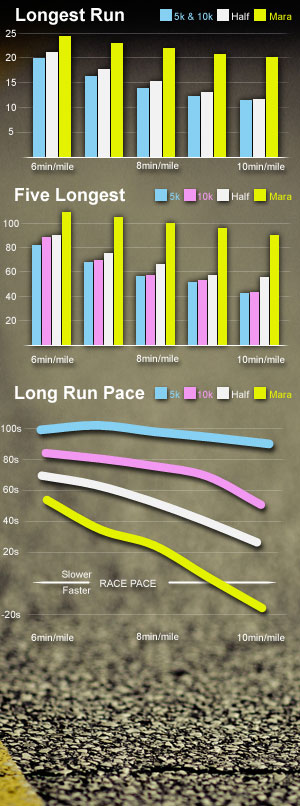
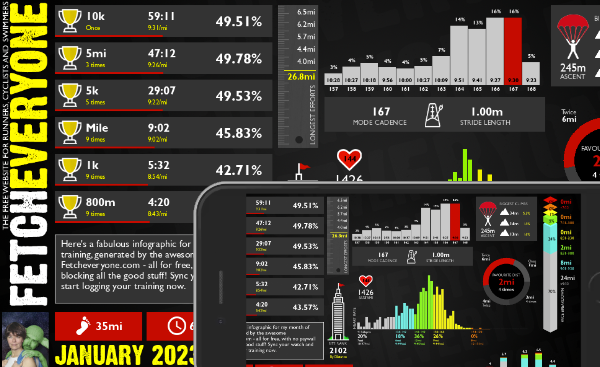
Monthly Summary
A brand new shareable infographic showing a colourful breakdown of your training month.

Marathon Prediction
We delve deeper to give you greater insights when working out your goal marathon time.
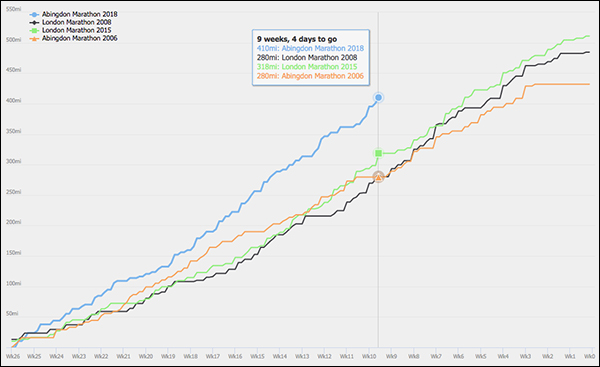
Pre-race Training Analysis
See your accumulated mileage in the weeks leading up to any event in your portfolio, and compare it to your other performances

Your 365 Day Totals
Peaks and troughs in training aren't easy to find. Unless you use this graph. Find out what your peak training volume really is
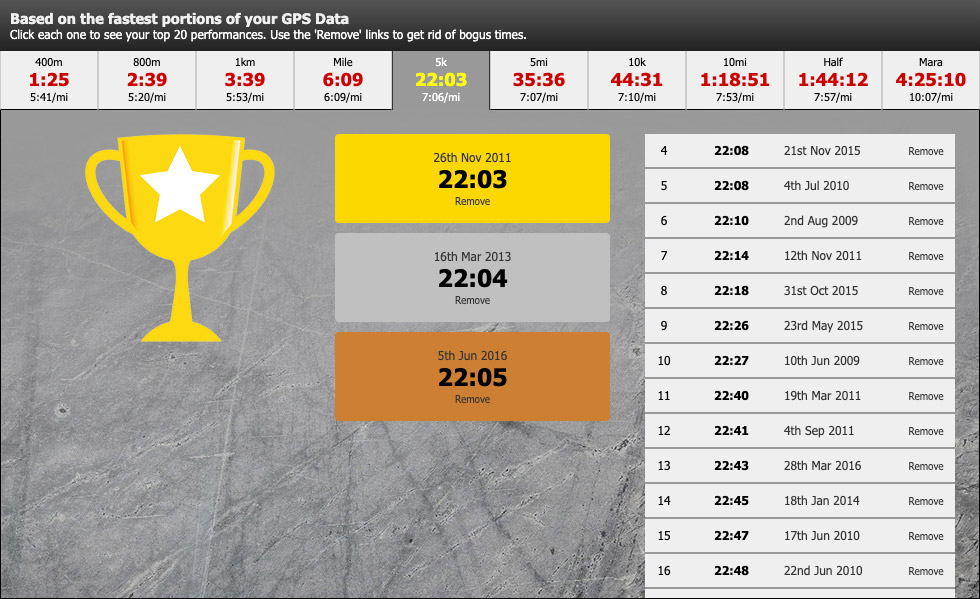
Benchmarks
See the fastest portions from all your training runs. Filter by time to give you recent bests to aim at. Every distance from 400m to marathon.
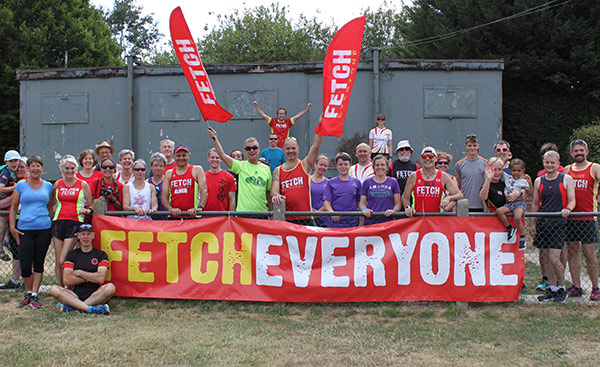
Fetch Everyone Running Club
Join our UKA-affiliated club for event discounts, London Marathon ballot places, the chance to get funded for coaching qualifications, and a warm feeling inside.

Leave a comment...
-
Good stuff. I'm surprised by the long runs/5 longest data. In the shorter races did you exclude the data for those people who had recently run longer ie to only use data for the runners upto 10k races? Having just run a spring marathon I'm also now running a few summer 5k races but clearly benefiting from my longer base runs over the winter.
Mushroom
-
Jolly good stuff but remember that correlation is not causation: it's not necessarily the case that faster runners are faster *because* their long runs are (relatively) slower. It could be that their longer runs are (relatively) slower because they are faster -- there's more leeway between their race pace and being stationary for instance. Or because their long runs are longer.
Drell
-
Excellent stats-geekery coupled with a wise homily to take home. A Fetch classic.

Angus Clydesdale
-
Good stuff Fetch enjoyed the read and spread the news for you.

Pedro_Perez
-
Great stats is without wanting to sound condascending (sp?) good to see confirmation of what for the norm we know to be true. The more miles and hours you put in the faster you will become.
MaT.T
-
While I agree with Drell that correlation does not prove cause it is nonetheless interesting to see just how much slower than race pace that fast marathon runners do their long runs. However I am puzzled by the vertical axis of the last figure. Would 50 indicate that during the LR min/mile is 50% greater than race pace? If so the 6 m/m marathoners appear to do their long run at around 9:30 m/m whereas in the text you say that LR is only 1 m/m slower than race pace.
Canute
-
It's seconds sorry - I'll add some units.
fetcheveryone
-
So this is what you're supposed to do with all that Garmin data? I thought it was just for collecting.
 A nice piece of analysis.
A nice piece of analysis.
RichHL
-
Great article again - really telling graph showing that faster runners go slow down from race pace for their long runs *more* than slower runners. Did you use Running - Long Run or just any run over 18 20 or 22 miles? I log long runs at pace as MP would that have been included or discarded? :-)G
HappyG(rrr)
-
I didn't use the categorisation at all - it was just based on distance - and I didn't set a lower limit because that would have been like imposing my own rules.
fetcheveryone
-
Ah hang on just been pointed out to me that even for the best runners that shows only 60s slower than race pace. Hmmm. I'll save this comment for a feedback message as I am confuzzled. Still a pretty graph tho! :-)G
HappyG(rrr)
-
Now that's a different question entirely

fetcheveryone
-
Plan to do my first marathon in May next year. Puts into perspective the number of training miles I'll have to put in !
spotswood
-
Loving these articles .... probably because I'm a stats geek too ..... The word has been spread

Flip Flop
-
I rarely manage more than 3 runs a week and aim for 10 mile runs once a week in preparation for a half. Now I see why my legs run out of steam after about 90 mins. Must aim for more long and steady runs. I was blaming my age!
Raggedy runner
-
i dont get the last graph. surely even the 10 min miler should run their long runs about a minute slower than the race?
Crazy Lady
-
What it's saying is that for e.g. marathon distance the 10 minute miler will typically run their longest runs about 20s quicker than the pace they complete the marathon. So they'd run the marathon at 10 mins/mile but their longest runs would be at about 9:40/mile.
fetcheveryone
-
which could mean the 10 min/milers had intended to be 9 min/milers so their long runs were slower than intended race pace just didn't achieve target !?
Corona
-
You've wandered into the subject material for my next article

fetcheveryone
-
Nice graphs

Smout
-
16 weeks. But looking at longer term training would be interesting too

fetcheveryone
-
I find this hard to articulate but hopefully someone will get what im on about! Assuming both runners finish the marathon equally exhausterd A ten minute miler for the marathon is surely working at a much lower intensity than the six minute miler? Therefore slower runners will more easily be able to run at paces close/faster than their marathon pace. All seems to make sense to me and I think the last graph explains this perfectly!

Race Jase
To comment, you need to sign in or sign up!What was the elapsed time you looked at - 5 longest runs in 10 12 18 weeks... or longer?